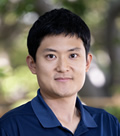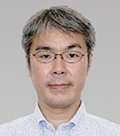EVENTイベント情報
We are pleased to announce that “The 6th International Symposium on AI and Electronics” is going to be held.

Program
Day 1 (Wednesday, 29th January 2025)
| Chair Prof. Shibata |
9:30-9:40 | Welcome addressPresident Teiji Tominaga |
|---|---|---|
| 9:40-9:45 | Opening remarksProf. Toshiro Kaneko | |
| 9:45-9:50 | Announcement from Program chair | |
| Session 1Session Chair Prof. Nishiyama |
9:50-10:50 |
 Keynote speech 1
Keynote speech 1
Towards efficient single-photon emission from defects in two-dimensional materialsProf. Esther WertzAssociate Professor, Department of Physics, Applied Physics, and Astronomy, Rensselaer Polytechnic Institute |
| 11:00-11:30 |
 Invited talk 1 from a faculty member
Invited talk 1 from a faculty member
Key Technologies of AI-based Communications towards 6GProf. Nei KatoProfessor, Graduate School of Information Science, Tohoku University | |
| 11:35-12:35 | Lunch break | |
| Program chair | 12:35-13:30 |
Oral poster summary from 40 students (1 min each) |
| 13:40-15:40 |
Student poster session | |
| Session 2Session Chair Prof. Tseng |
15:50-16:50 |
 Keynote speech 2
Keynote speech 2
A Document Intelligence Journey: From Fine-Tuning to Generative AI-Powered Contextual LearningDr. Amy LuPrincipal Software Engineering Manager, Microsoft AI R&D Center, Taiwan |
| Program chair | 17:30-19:30 | Welcome reception |
Day 2 (Thursday, 30th January 2025)
| 9:25-9:30 | Announcement from Program chair | |
| Session 3Session Chair Prof. Omachi |
9:30-10:30 |
 Keynote speech 3
Keynote speech 3
Can Artificial Intelligence Reduce Future Disasters?Prof. John ChoeDirector & Associate Professor, Disaster Data Science Lab, University of Washington |
|---|---|---|
| 10:40-11:40 |
 Keynote speech 4
Keynote speech 4
AI-Mediated Reality: From Synthesis to VerificationDr. Koki NaganoPrincipal Research Scientist NVIDIA Research, USA | |
| 11:45-12:45 | Lunch break, display of student’s posters | |
| Program chair | 12:45-13:45 |
Oral poster summary from 40 students (1 min each) |
| 13:50-15:50 |
Student poster session | |
| Session 4Session Chair Prof. Hariyama |
16:00-16:30 |
 Invited talk 2 from a faculty member
Invited talk 2 from a faculty member
Non-contact Measurement of Physiological Signals for Health MonitoringProf. Norihiro SugitaProfessor, Graduate School of Engineering, Tohoku University |
| 16:30-17:00 |
 Invited talk 3 from a faculty member
Invited talk 3 from a faculty member
Human Capital Efficiency and Talent versus Luck ModelProf. Hiroshi HamadaProfessor, Graduate School of Arts and Letters, Tohoku University | |
| 17:05-17:15 | Closing remarksProf. Masahiro Yamaguchi |
 Keynote speech 1
Keynote speech 1
Towards efficient single-photon emission from defects in two-dimensional materials
Prof. Esther WertzAssociate Professor, Department of Physics, Applied Physics, and Astronomy, Rensselaer Polytechnic Institute
Abstract
The potential of quantum information science is fueling demand for the design and generation of new qubits and devices operating at the single-particle level. One promising approach uses photons as information carriers. Their long decoherence lengths and fast operation speeds offer natural benefits for rapid and safe quantum communication; however, current state-of-the-art single photon sources are either bulky and poor choices for circuit integration or operate at cryogenic temperatures. On the other hand, color centers, such as defects in two-dimensional (2D) materials, are suitable for small-scale devices that can operate at room temperature, but these sources have their own limitations, particularly their restricted brightness due to luminescence lifetimes and intermediate dark states, and the control of excitation repetition rate. Moreover, we still lack some of the most fundamental understanding of these defects, and how structural properties correlate to their optical ones. To address the first set of challenges, we work to controllably and reproducibly couple these defects to plasmonic nano-antennas, which can confine light below the diffraction limit, and thus can be used to strongly manipulate quantum emitters and couple them to existing electronic circuits. For the second, we use machine learning to better understand the material properties that are relevant to our applications.
Biography
Esther Wertz obtained her PhD in Physics in 2010 for the work she did with Dr. Jacqueline Bloch at the CNRS Photonics and Nanostructures Laboratory in France. She did her postdoctoral work with Dr. Julie Biteen at the University of Michigan, then joined the Department of Physics, Applied Physics, & Astronomy at the Rensselaer Polytechnic Institute as an Assistant Professor in 2015. She is the recipient of a PicoQuant Young Investigator Award and an NSF CAREER award, and is the RPI UPWARDS for the Future Faculty. Her research at Rensselaer focuses on investigating light-matter interactions in the vicinity of nanostructures using super-resolution microscopy techniques, and on designing structures that interface with light in predetermined ways. She is also interested in exploring the new quantum properties that emerge when excitons in two-dimensional materials are coupled to localized surface plasmon resonances.
 Keynote speech 2
Keynote speech 2
A Document Intelligence Journey: From Fine-Tuning to Generative AI-Powered Contextual Learning
Dr. Amy LuPrincipal Software Engineering Manager, Microsoft AI R&D Center, Taiwan
Abstract
In this speech, we explore the technical advancements in Document Intelligence, a pivotal AI technology driving enterprise digital transformation. Document Intelligence leverages state-of-the-art machine learning models to automatically and accurately extract and interpret unstructured data from documents, including text, key-value pairs, tables, and structural information.
The presentation traces our journey from optical character recognition (OCR) capabilities to fine-tuned models tailored for specific document types, culminating in the recent integration of generative AI and large language models (LLMs). This paradigm shift enhances contextual understanding and scalability, driving significant advancements in efficiency and precision.
Through a discussion of methodology, technological breakthroughs, and real-world applications, we provide insights into how these innovations are addressing complex challenges and enabling new possibilities.
Biography
Dr. Amy (Mei-Hsuan) Lu is a Principal Software Engineering Manager at Microsoft AI R&D Center, Taiwan. She leads the Prebuilt Document Intelligence team under AI and Cloud Platform division, overseeing the design and development of Azure AI Services in the domain of document understanding and content comprehension.
Prior to her current role, Amy was an engineering manager in IC3 (Intelligent Conversation and Communications Cloud) team at Microsoft Redmond, USA. She led the Video Pipeline team, delivering industry-leading real-time video streaming solutions for products of Microsoft Teams, Skype, Skype for Business and Lync. As one of the key contributors to Microsoft’s Real Time Media Stack, she played an instrumental role in real-time protocol design, system architecture, product development, and fostering industry relationships in hardware acceleration.
Amy holds over 30 U.S. patents. She earned her Ph.D. in Electrical and Computer Engineering from Carnegie Mellon University and a Master’s degree in Computer Science and Information Engineering from National Taiwan University.
 Keynote speech 3
Keynote speech 3
Can Artificial Intelligence Reduce Future Disasters?
Prof. John ChoeDirector & Associate Professor, Disaster Data Science Lab, University of Washington
Abstract
The year 2020 will be remembered by many generations as one of the most disastrous years in global history. We witnessed life-altering impacts of a pandemic during the warmest year on record along with wildfires, tropical cyclones, and other extreme hazards. The U.S. sustained historically the largest number of weather/climate disaster events with losses exceeding $1 billion in 2020 until 2023 broke this record. 2023 also set a new warmest-year record. Globally, we see an increasing trend of disasters. In response to this pressing challenge, what can we do? Can artificial intelligence (AI) that continually innovate private sectors revolutionize public sectors’ disaster management? This talk will highlight challenges and opportunities for AI in disaster management.
Biography
John Y. Choe is the Director of the Disaster Data Science Lab, the Deputy Director of the Center for Disaster Resilient Communities, and an Associate Professor of Industrial & Systems Engineering at the University of Washington, Seattle. His work has been supported by the U.S. National Science Foundation, National Institute of Environmental Health Sciences, Centers for Disease Control and Prevention, and other public and private sector organizations. He received his Ph.D. in Industrial & Operations Engineering and M.A. in Statistics from the University of Michigan, Ann Arbor.
 Keynote speech 4
Keynote speech 4
AI-Mediated Reality: From Synthesis to Verification
Dr. Koki NaganoPrincipal Research Scientist
NVIDIA Research, USA
Abstract
We are witnessing a rise in generative AI technologies that make the creation of digital avatars automated and accessible to anyone. While it is clear that such AI technologies will benefit numerous digital human applications, from video conferencing to AR/VR, their successful adoption hinges on their ability to generalize to real-world data. In this talk, I discuss our efforts to build 3D digital human foundation models that can be used to create many downstream applications. First, I will share our recent efforts on learning to generate photorealistic 3D faces from a collection of in-the-wild 2D images. Furthermore, I will show how such photorealistic 3D synthetic data can be used to train another AI model for downstream applications, such as a single-view reconstruction of photorealistic faces. Lastly, I will address the emerging challenge of verifying the authenticity of synthetic avatars in a world where their legitimate use becomes ubiquitous.
Biography
Koki Nagano is a Principal Research Scientist at NVIDIA. He works at the intersection of Graphics, Vision and AI with focus on generating realistic 3D digital humans. His research on accessible photorealistic human digitization has been shown in places including World Economic Forum, TED, and won the “Best-in-Show” award at SIGGRAPH 2021. He also collaborates with DARPA and top forensics experts on topics to combat visual misinformation, such as deepfakes. He obtained his PhD from the University of Southern California advised by Dr. Paul Debevec and his BE from Tokyo Institute of Technology. He previously worked for Pinscreen, and interned at Meta Reality Labs and Weta Digital.
 Invited talk 1 from a faculty member
Invited talk 1 from a faculty member
Key Technologies of AI-based Communications towards 6G
Prof. Nei KatoProfessor, Graduate School of Information Science, Tohoku University
Abstract
In both academia and industry, the exploration of 6G—a further advanced cellular communication technology—has already begun. As our society becomes increasingly digitalized, hyper-connected, and globally data-driven, future services are anticipated to rely heavily on virtually instantaneous, unlimited wireless connectivity. This presentation will outline the key drivers, challenges, and essential research topics associated with 6G. In particular, I will provide an overview of the cutting-edge technologies in this field, spanning aspects such as the physical layer, networking, and new use cases and service enablers.
Biography
Nei Kato is a full professor and dean at the Graduate School of Information Sciences, Tohoku University. He has studied computer networking, wireless mobile communications, satellite communications, ad hoc & sensor & mesh networks, UAV networks, AI, IoT, and Big Data. He has published over 500 papers in prestigious peer-reviewed journals and conferences, a Clarivate Analytics Highly Cited Researcher from 2019 to 2024. He is the Editor-in-Chief of the IEEE Internet of Things Journal, a fellow of IEEE, and IEICE.
 Invited talk 2 from a faculty member
Invited talk 2 from a faculty member
Non-contact Measurement of Physiological Signals for Health Monitoring
Prof. Norihiro SugitaProfessor, Graduate School of Engineering, Tohoku University
Abstract
We are developing innovative methods for monitoring physiological conditions over extended periods of time, with the goal of improving healthcare and personal well-being. In this talk, we will introduce remote PPG (rPPG), an advanced technique that allows for the measurement of plethysmograms without any physical contact. We will also present our proposed methods for estimating physiological parameters, such as blood pressure and oxygen saturation, based on rPPG signals, and discuss their potential applications in both clinical and everyday settings.
Biography
Norihiro Sugita received the Ph.D. degree in engineering from Tohoku University in 2004. He is currently a professor in the Cyberscience Center, Tohoku University. His research interests include biomedical signal analysis, system identification and modeling applied to mechanisms of cardiovascular control, and applications of virtual reality techniques to medicine. He is a member of IEEE, JSMBE, SICE, and VRSJ.
 Invited talk 3 from a faculty member
Invited talk 3 from a faculty member
Human Capital Efficiency and Talent versus Luck Model
Prof. Hiroshi HamadaProfessor, Graduate School of Arts and Letters, Tohoku University
Abstract
The Talent versus Luck model, awarded the 2022 Ig Nobel Prize, explores the roles of talent and luck in an individual’s career success through computer simulations. The model demonstrates that capital distribution has a heavy-tailed pattern, indicating that the most successful individuals are not necessarily the most talented. While the original model's findings are intriguing, they rely solely on numerical calculations, raising questions about their general validity. In this talk, I present a reformulated, simplified model and demonstrate that the resulting capital distribution follows a lognormal pattern, even when talent is normally distributed. Additionally, I analyze data from the Global Talent Competitiveness Index to examine changes in the rate of return on talent to GDP worldwide from 2013 to 2023.
Biography
Hiroshi Hamada is a professor at Department of Behavioral Science, Graduate School of Arts and Letters, Tohoku University. His research interests include income inequality, relative deprivation, and mathematical sociology. He was a senior scientific research specialist of Ministry of Education, Culture, Sports, Science and Technology (2010-2012) and the president of Association of Japanese Mathematical Sociology (2021-2023). He published papers in Journal of Mathematical Sociology, Sociological Theory and Methods (Official Journal of Association of Japanese Mathematical Sociology), and Advances in Complex Systems.





